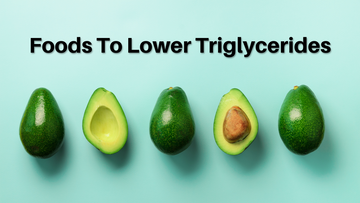In today’s fast-paced world, dietary habits often fall by the wayside, leading to numerous health issues—one of the most common being elevated triglycerides. Triglycerides are a type of fat found in your blood and are crucial for providing energy. However, high levels of triglycerides can increase the risk of heart disease and could be considered a marker of metabolic syndrome. Controlling your triglyceride levels is important, and fortunately, dietary choices play a significant role in this.
Understanding which foods can help lower triglycerides can empower you to make smarter, healthier decisions. This blog will delve into various foods and diets that are effective in reducing triglyceride levels, boosting overall well-being, and curbing the risk of heart-related ailments.
Also Read: Unraveling Triglycerides: Exploring Their Impact on Health
What Are Triglycerides?
Triglycerides are a type of lipid that circulates in your bloodstream. When you consume calories, particularly from carbohydrates and fats, your body converts these excess calories into triglycerides, which are then stored in your fat cells. Hormones later release these triglycerides to give you energy between meals.
Having a certain amount of triglycerides is necessary for proper bodily functions, but consistently high levels can be problematic. Elevated triglycerides are often a result of a diet high in sugars and unhealthy fats, sedentary lifestyle, obesity, and underlying health conditions such as diabetes. High triglyceride levels can lead to the hardening and thickening of artery walls (arteriosclerosis), increasing the risk of stroke, heart attack, and heart disease.
Also Read: Symptoms of High Cholesterol
Triglyceride-Lowering Diets
Diet To Lower Triglycerides: A well-rounded diet is crucial for managing triglyceride levels. The following dietary options can significantly contribute to lowering high triglyceride levels:
Mediterranean Diet
The Mediterranean Diet is renowned for its heart-healthy benefits. This diet emphasizes the consumption of fruits, vegetables, whole grains, fish, and healthy fats such as olive oil. Research suggests that this diet can reduce triglyceride levels due to its high fiber content and beneficial fats.
Low-Carb Diet
Reducing carbohydrate intake can play a significant role in lowering triglycerides. Carbohydrates, especially sugars and refined grains, can spike triglyceride levels. A low-carb diet focuses on lean proteins, vegetables, and healthy fats, which help in reducing triglycerides effectively.
Plant-Based Diet
A diet rich in plant-based foods like legumes, nuts, seeds, fruits, and vegetables is another effective approach to managing triglyceride levels. These foods are high in fiber and contain beneficial nutrients that support overall cardiovascular health.
Foods That Lower Triglycerides Fast
Various foods have been shown to lower triglyceride levels quickly and effectively:
Fatty Fish
Rich in omega-3 fatty acids, fatty fish like salmon, mackerel, and sardines can significantly reduce triglycerides. Omega-3s are known to reduce inflammation and lower levels of triglycerides in the blood.
Nuts and Seeds
Nuts and seeds, especially almonds and flaxseeds, are packed with fibers and healthy fats. They help in controlling triglyceride levels by promoting better metabolism and reducing overall fat concentration in the blood.
Green Leafy Vegetables
Green leafy vegetables such as spinach, kale, and broccoli are high in nutrients and low in calories. Their fiber-rich content aids in lowering triglycerides and improving heart health.
Whole Grains
Whole grains like oats, brown rice, and quinoa are excellent sources of fiber. They help stabilize blood sugar levels and reduce the absorption of fat, subsequently lowering triglyceride levels.
Avocado
Avocados are a great source of healthy monounsaturated fats. Regular consumption can lower bad cholesterol and triglyceride levels while providing a myriad of essential nutrients.
Also Read: The Life-Changing Benefits of Not Eating Sugar for a Healthier, Happier You
Best Ways To Lower Triglycerides
Several lifestyle changes are essential for managing triglyceride levels:
Regular Exercise
Physical activity is one of the most effective ways to lower triglycerides. Engaging in at least 30 minutes of exercise five days a week can improve your metabolism and help in burning fat more efficiently.
Reduce Sugar Intake
Cutting down on added sugars and refined carbohydrates can have a profound effect on triglyceride levels. Foods like sugary drinks, candies, and pastries should be limited.
Avoid Trans Fats
Trans fats, commonly found in processed foods, are harmful to your heart's health. Avoiding foods that contain hydrogenated oils can significantly reduce your triglyceride levels.
Maintain a Healthy Weight
Obesity is a major risk factor for high triglycerides. Maintaining a healthy weight through a balanced diet and regular exercise can greatly reduce triglyceride levels.
Limit Alcohol Intake
Alcohol can increase triglyceride levels, especially in those who are already predisposed. Limiting alcohol consumption can thus help in managing triglyceride levels better.
Also Read: Enhancing Your Heart Health: A Comprehensive Guide on How to Prevent Heart Disease
Conclusion
Maintaining healthy triglyceride levels is vital for cardiovascular well-being and overall health. Dietary choices, including incorporating specific foods like fatty fish, nuts, and green leafy vegetables, play a crucial role. Additionally, adopting diets like the Mediterranean, low-carb, or plant-based diets can provide structured approaches to achieving lower triglyceride levels. Regular exercise, maintaining a healthy weight, and limiting sugar and alcohol intake are also essential strategies.
By making these lifestyle and dietary changes, you can significantly reduce your triglyceride levels, improve heart health, and enjoy a better quality of life. Remember, every small change counts, and it's never too late to start taking steps towards a healthier you.








